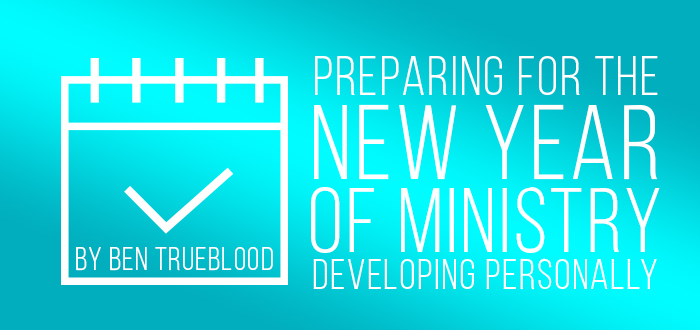The following post was written by Ben Trueblood, Director of Lifeway Student Ministry
(Click underlined text for link)
For the last three weeks we have been looking at the pieces of a wise discipleship plan: why the plan is important, developing your leaders, and the role that events play within the plan. No wise discipleship plan would be complete without including a plan for yourself. 2015 is right around the corner, and while I’m not the biggest fan of new year’s resolutions, I am a fan of plans. Without a plan there’s no destination, which is a place you don’t want to find yourself at the end of 2015.
So, how are you going to grow throughout the next year? That is a question that every leader needs to wrestle with. If you’ve never taken the time to write down a plan or some goals for a year (or more) of your life then the process might seem a little awkward at first. It is worth it to push through because you’re a leader. John F. Kennedy once said, “leadership and learning are indispensable to each other.” That is the case here, for you and I, in the next year. If we don’t learn then we forfeit the right to be leaders. To learn most effectively you need to have a plan. Here are some things that will help you as you form your plan for 2015, and hopefully the years to come.
- Read – what books are you going to read this year? Many dismiss this notion with a “I’m not really much of a reader.” This is a terrible statement to make as a leader. Don’t just take it from me though. Listen to former President Harry S. Truman: “Not all readers are leaders, but all leaders are readers.”
- Find mentors – there are people who have already done what you are trying to do. Find them and learn from them. Try to find a few of these people, including ones outside of the full-time ministry category.
- Listen – it’s easy to listen to people who love you. Once in a while you need to listen to people who don’t. Take feedback that you have heard over the last year and consider how you will address it in the coming one.
- Set clear goals – a goal gives you a target. Write them down and refer to them throughout the year. Goals elevate urgency, pressure, and accountability. They also elevate direction, vision and purpose.
- Share those goals – an unshared goal is easily forgotten when the work gets difficult.
- A new skill – consider developing a new skill that’s not connected to your normal everyday life. Some examples may be learning a new language or playing a musical instrument.
- Spiritual growth – what are you going to do to grow spiritually? Is there a specific discipline that needs to be your focus? Is there a specific way that you are going to approach your personal Bible study? It isn’t unspiritual to have a plan in this area.
I mentioned that I wasn’t the biggest fan of New Year’s resolutions. That’s still true. The reason is because the majority of them are broken before February. That reality is true because the majority of resolutions are set without clear plans to accomplish them, and even with clear plans there is still a chance for failure. That has been true for me over the last year. As I review my goals for 2014, there were some successes, as well as some failures. I have been able to learn a lot from both categories and that learning is already building my excitement for 2015’s battle plan.
I would love to hear from you on this topic! Take a minute to leave a comment below on some of the ways that you preparing to grow as a leader in 2015. Hey, this might even be the place where you decide to share a goal publicly. I’ll get us started with some goals I have for next year: read at least 2 books per month, learn to play the piano, kill a turkey.
Your turn!



